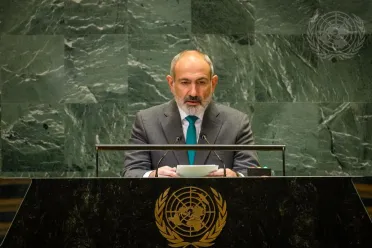Statement
Statement summary
NIKOL PASHINYAN, Prime Minister of Armenia, noting that his statement today will be “significantly different from the previous ones”, said: “Peace between Armenia and Azerbaijan not only is possible, but is within reach.” Recalling that both countries signed an agreement relating to the delimitation of the border between them on 30 August, he emphasized that this is the first bilateral legal document signed between the parties. In it, both agreed to set the 1991 Alma-Ata Declaration “as the basic principle of border delimitation between the two countries”, he said. “This means that Armenia and Azerbaijan de jure reconfirm the principle of recognizing each other’s territorial integrity and inviolability of borders that existed during the Soviet Union,” he pointed out, stressing: “Now it is de jure reconfirmed that the two countries have no territorial claims on each other.”
Now, he said, both parties must take the next step and sign the agreement on establishing peace and inter-State relations between Armenia and Azerbaijan, of which “at least 80 per cent” has been agreed upon — as he and Azerbaijan’s President have “stated many times”. To avoid a deadlock, he proposed “to take what has already been agreed in the draft agreement, sign it, have a peace agreement between Armenia and Azerbaijan and then go on with negotiations on pending issues”. Armenia is “ready to do this right now”, he underscored, as regardless of how comprehensive an agreement is, many important issues will need to be further addressed. Therefore, signing the peace agreement as it stands “will significantly facilitate the resolution of the non-agreed issues”, he stressed. The existence of de jure peace between the two countries and the establishment of diplomatic relations — achieved through signing the agreement at hand — “will result in changing the overall atmosphere and the perception of our Governments and peoples, which will significantly facilitate the solution of the remaining issues”, he emphasized.
He said that Azerbaijan, however, insists that Armenia’s Constitution is an obstacle to the peace agreement due to its alleged inclusion of territorial claims against Azerbaijan. “There is nothing of this kind in our Constitution,” he underscored; rather, it is Azerbaijan’s Constitution that contains such claims against Armenia. He stressed, however, that his country does not consider the other’s Constitution as an obstacle to the peace accord, as that instrument provides that neither party may invoke “internal legislation” as justification for failure to perform. “Therefore, the signing of the agreement will address the concerns of both Armenia and Azerbaijan, and will create legal guarantees for addressing them fundamentally,” he concluded. Detailing the Constitutional procedure for ratifying international agreements, he noted that — if the proposed peace agreement is indeed ratified — then its provisions would supersede any contrary ones in domestic law. He added: “The same logic would apply to Azerbaijan, of course.”
“As you can see, here is peace so close to us, and all we need to do is reach out and take it,” he said. While it is not easy for either country — “because each of us has our own truth, and the debate over those truths has led to enmity, casualties and wars” — he urged a focus on peace, “because peace is the only truth understandable to the people of Armenia and Azerbaijan”. That truth, he added, will “open our eyes and shut down the sources of enmity, and we will all look to the future”. Detailing his Government’s “Crossroads of Peace” project — “also dedicated to that future” — he said this will open transport routes between the two countries, provide communications between Armenia, Azerbaijan, Türkiye and “the whole region”, create opportunities for the passage of pipelines and cables and “eventually provide opportunities for people-to-people contacts, which is a key and critical factor for peacemaking”.
Full statement
Read the full statement, in PDF format.
Photo

Previous sessions
Access the statements from previous sessions.
